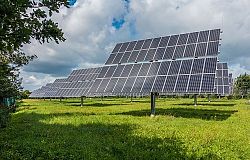

A proposed solar farm in the Essex green belt has been approved following a planning appeal.
An application for the development was submitted in February 2021. Chelmsford City Council decided to reject the application because of its impact on the green belt combined with heritage impacts. The National Planning Policy Framework (NPPF) states that inappropriate development in the green belt is harmful; a policy that carries a lot of weight when it comes to balancing planning decisions.
Whilst it is acknowledged that the proposed solar farm would be in conflict with this policy, the inspector had to consider a range of matters relating to the proposal, including the impact on the green belt and local heritage, the affect on landscape character, appearance, agriculture etc. They also considered whether the harm to the green belt would be outweighed by "very special circumstances".
Inspector Ben Plenty, in consideration of the proposal, set out that (amongst other things):
Mr Plenty also had to take into consideration the fact that the Government has declared a climate emergency and has set a legally binding target of achieving net zero emissions by 2050.
With this in mind, the inspector stated that the development would "deliver a renewable energy facility that would create up to 49.9MW of power. This would provide power for around 16,581 households, result in a carbon dioxide displacement of around 11,210 tonnes per annum and therefore help combat climate change." Given the fact that this would cause harm to the green belt, the NPPF requires very special circumstance to be demonstrated to justify the harm.
It was decided that the benefits of the proposal would outweigh the harm in this case and should be allowed to go ahead because the public benefit establishes such a special circumstance. The appeal was therefore allowed and the proposal can go ahead, subject to several conditions imposed by the inspector.